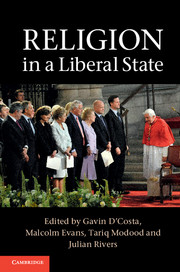Book contents
- Frontmatter
- Contents
- List of contributors
- Acknowledgements
- Introduction
- 1 Religion in a liberal state
- 2 The European Court of Human Rights and religious neutrality
- 3 Religion and sexual orientation: conflict or cohesion?
- 4 Liberal religion and illiberal secularism
- 5 Moderate secularism in liberal societies?
- 6 Excluded, included or foundational?
- 7 Justificatory secularism
- 8 What lacks is feeling: mediating reason and religion today
- 9 Arguing out of bounds: Christian eloquence and the end of Johannine liberalism
- Index
- References
9 - Arguing out of bounds: Christian eloquence and the end of Johannine liberalism
Published online by Cambridge University Press: 05 June 2014
- Frontmatter
- Contents
- List of contributors
- Acknowledgements
- Introduction
- 1 Religion in a liberal state
- 2 The European Court of Human Rights and religious neutrality
- 3 Religion and sexual orientation: conflict or cohesion?
- 4 Liberal religion and illiberal secularism
- 5 Moderate secularism in liberal societies?
- 6 Excluded, included or foundational?
- 7 Justificatory secularism
- 8 What lacks is feeling: mediating reason and religion today
- 9 Arguing out of bounds: Christian eloquence and the end of Johannine liberalism
- Index
- References
Summary
In his contribution to this volume, Raymond Plant explores what justification liberalism can offer for itself to those who, in one way or another, have reasons not to affirm it. Putting the question even more pointedly, we might ask, can political liberalism justify itself to religious citizens for whom the claims of the state and the commands of God might be in tension? Whatever answers we might have offered in the past, Plant believes that the situation is increasingly problematic due, in part, to policies such as the Human Rights Act 1998 and the Equality Act 2010. He argues that these have replaced a vague ‘ethos’ of liberalism – one that can be fudged and glossed over in the face of tension – with quite explicit rules and principles that admit no fudging or glossing.
Under such a regime, the picture that emerges is one that resonates with what Leo Strauss called the theo-political problem: the Philosopher, the Jew and the Christian will sometimes find themselves subject to multiple loyalties that admit of no harmonization. For Strauss, this threat is best captured in the death of Socrates. The leaders of Athens thought that Socrates’ teaching threatened the common good, but Socrates’ loyalty was to the pursuit of truth. That was his calling and, whatever the consequences for the city, Socrates could do no other. In such cases, we can find ourselves cast in the unwelcome role of Antigone, caught between loyalty to her city and its ruler, on the one hand, and her brother and her gods, on the other. Although Strauss got to this conclusion as a philosopher indebted to Plato, and also as a Jew, the picture is also a deeply Christian one – or at least one with which Christians find much resonance.
- Type
- Chapter
- Information
- Religion in a Liberal State , pp. 219 - 243Publisher: Cambridge University PressPrint publication year: 2013
References
- 1
- Cited by



